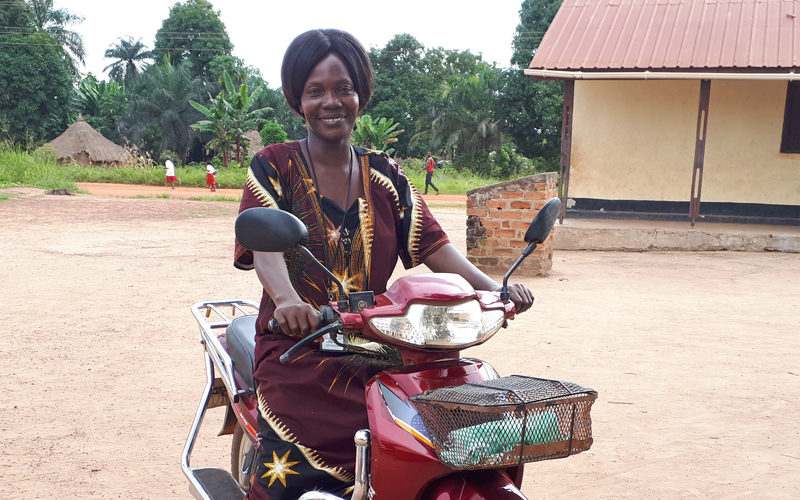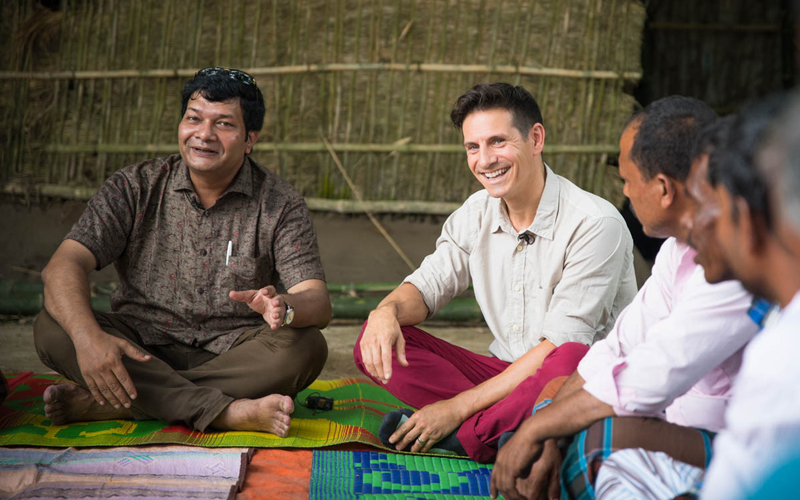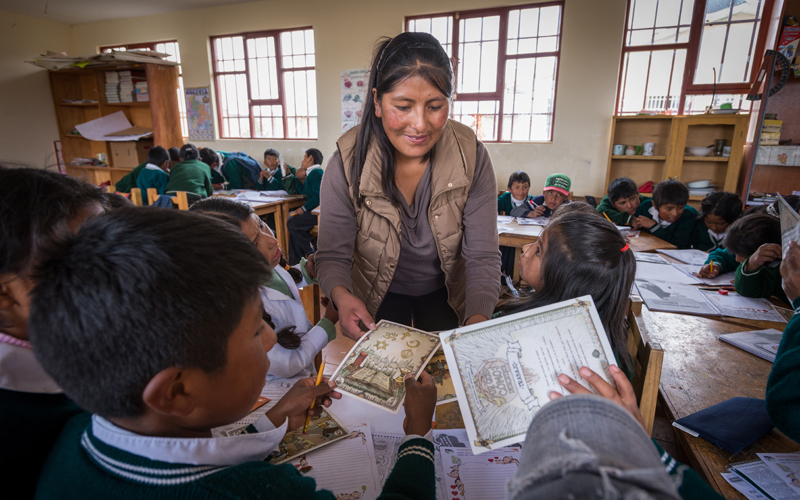Get to know a few of our dedicated and devoted colleagues working on the front lines, often going above and beyond to serve the needs of the most vulnerable children, in some of the most challenging contexts.
Christine Ngbaazande – Social Reintegration Coordinator, South Sudan

Christine travels by motorcycle to visit and support community leaders in advocating for women and children. Photo: Cecil Laguardia
Christine Ngbaazande began working with women to break the stigma experienced by survivors of sexual violence and children born of rape in South Sudan in 2016, following a brutal civil war.
“Today, I have the ability to talk with anyone - women, church leaders, even the government officials. I can advocate on behalf of all the marginalized women and children to help realize their human rights and care for survivors,” says Christine, who has helped train more than 50 local advocates to encourage greater respect for the rights of women and girls, and to encourage the social inclusion of 752 former child soldiers.
It’s unusual for women to travel alone in South Sudan, so seeing Christine drive her motorbike to support the local advocates is inspiring for young girls. A ‘mother on the go’, she worked until the day before giving birth to her newest baby and returned immediately to work, taking breaks to breastfeed her newborn.
Because of her efforts, the community is coming back together after a heart-breaking civil war, supporting boys and girls to become children again and find forgiveness.
In March 2019, Christine was recognized with the prestigious
Bond’s Humanitarian Award, celebrating “unsung superheroes in the humanitarian field”.
Read more about Christine.
Julius Sakar – ENRICH Monitoring and Evaluation Manager, Bangladesh
 Julius, left, with Canadian media personality Rick Campanelli, at a men’s care group meeting where men share experiences and learn ways they can be role models and advocates for their children. Photo: Paul Bettings
Julius, left, with Canadian media personality Rick Campanelli, at a men’s care group meeting where men share experiences and learn ways they can be role models and advocates for their children. Photo: Paul Bettings
Julius Sakar is a big believer in the importance of partnerships. He should be, having witnessed first-hand the value of ENRICH, a project funded by the Government of Canada and in partnership with other NGOs to improve nutrition for mothers and babies and to end preventable child deaths.
He regularly meets with men from local communities in care groups where they share experiences and learn about more ways they can be role models and advocates for their children.
“I feel excited and happy when I work for children. ENRICH is a challenging project which is working for mother and child health. This project is intended to reduce the mortality rate of under five children through a holistic effort, combining several components, like strengthening local government structures, improving consumption of nutrition-dense food, cultivation of bio-fortified crops, and incorporating advocacy and gender equality into all programming.”
Julius felt so strongly about working for the program that he uprooted his wife and daughters away from their home in southern Bangladesh to live and work amidst the families he is serving. It was not an easy move but one that he wanted to make to impact the lives of children and families for the better.
Felisa Ramos Valencia - Facilitator, Project Against Trafficking of Children and Adolescents, Bolivia

Felisa Ramos Valencia leads workshops with sponsored children teaching them practical things they can do to guard against trafficking. Photo: Eugene Lee
Since 2012, Felisa Ramos Valencia has been working with World Vision in Bolivia as facilitator of the Project Against Trafficking of Children and Adolescents — a program that lobbies all levels of government for children’s rights and raises awareness against trafficking.
She regularly leads workshops with sponsored children teaching them practical things they can do to guard against trafficking.
A former sponsored child herself, she is the first woman in her home community of Soracachi to graduate from high school, and then university, challenging traditional expectations of what women can do. And she’s become a role model for other little girls in Soracachi, showing that through education, the future is wide open for them.
After university Felisa could have chosen to work with a law firm in the city, but she’s chosen to return home and help children achieve their dreams.
“As a child that has been sponsored in the past, I feel very, very proud of having been one,” Felisa says. “I have come to World Vision to give back what I have received. I constantly tell my students that they have to, like I did, have a dream and never let go of that dream.”
Read more about Felisa.